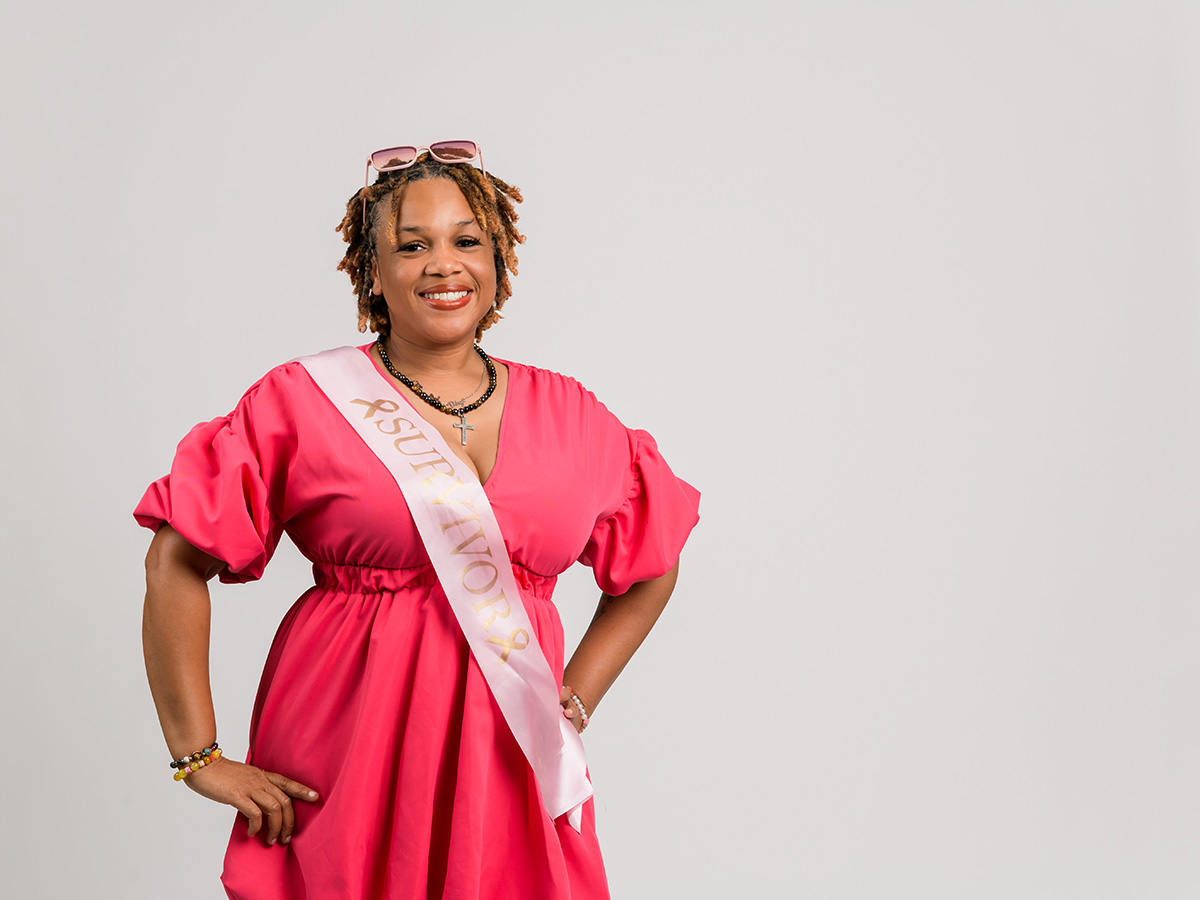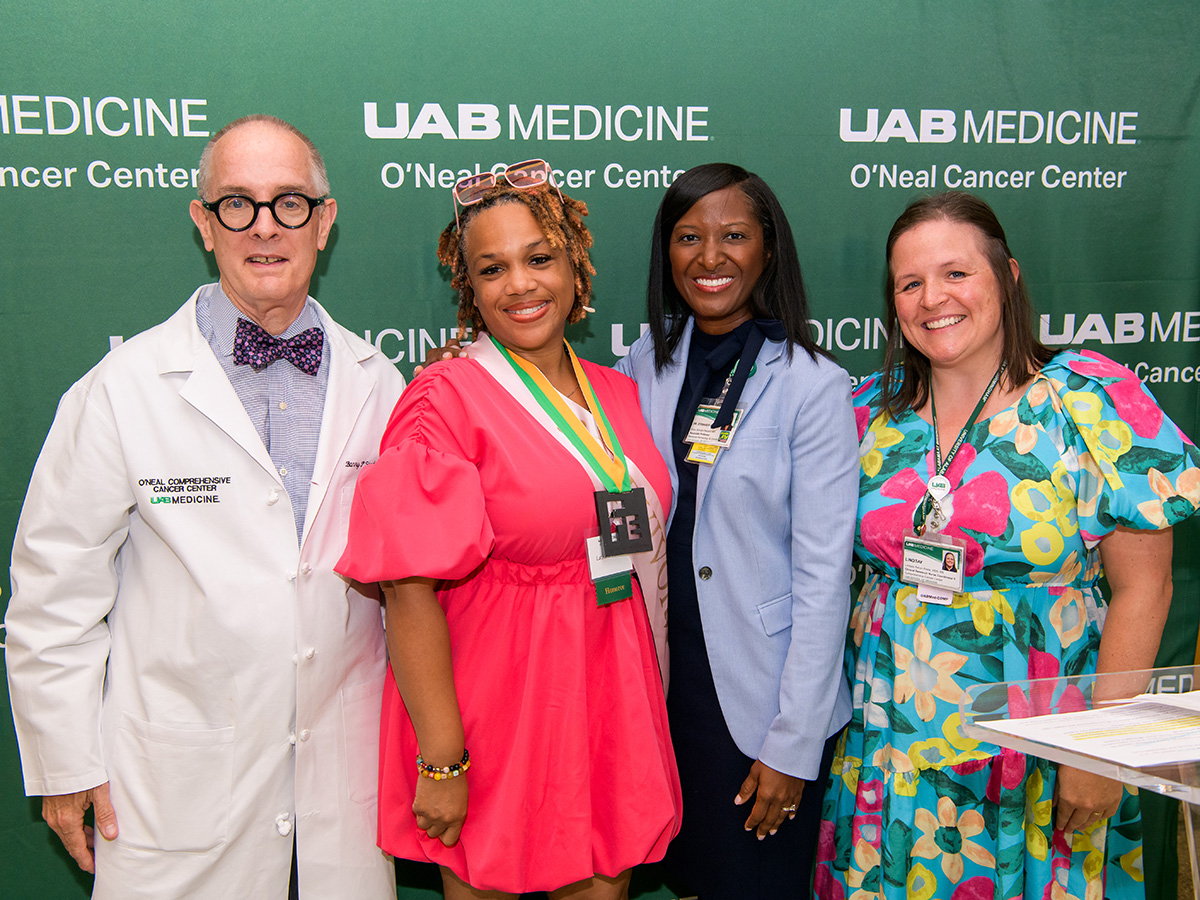 At just 43 years old, Latrivia Carter was diagnosed with stage 2 triple-negative breast cancer.
At just 43 years old, Latrivia Carter was diagnosed with stage 2 triple-negative breast cancer.
At just 43 years old, Latrivia Carter was diagnosed with stage 2 triple-negative breast cancer. When she first heard the news, Carter started to panic. This was the same type of cancer that her sister had died from just a few years prior.
“When I first received my diagnosis, I was panicking because I watched what sister went through during her treatment,” Carter said. “I immediately went home and started praying. I have three children, and I prayed that I would make it through this and see them graduate.”
Carter met with her physicians at the University of Alabama at Birmingham O’Neal Cancer Center to learn more about her cancer diagnosis and potential treatment options. Carter had multiple treatment options to consider, but she had two that she was considering more closely: She could choose to receive the standard-of-care chemotherapy, or she could choose to participate in a clinical trial.
After seeing the fatigue and sickness that her sister had experienced during her own chemotherapy treatments, Carter decided to pursue the clinical trial option. She enrolled in the I-SPY trial — a study that is designed to personalize breast cancer treatment using targeted therapies. These therapies are carefully selected to match the type of tumor that each patient has. The study wants to give patients the treatment they need for a good result, while possibly avoiding unnecessary side effects.
“Triple negative breast cancer is the most proliferative and aggressive of breast cancers and one in which we have less targets to direct treatments,” said Mauricio Escobar, M.D., an oncologist and associate professor in the UAB Division of Hematology and Oncology. “Because of this, outcomes are not as good as with other subtypes. The clinical trial was a great option for her because it allowed her to access a novel combination of highly effective medications, which we suspect can lead to better outcomes with less side effects than the standard of care. She had a fantastic response with no evidence of residual cancer in the surgical resection.”
 Carter was honored, along with eight other patients, at the fourth annual O’Neal Iron Strong Award ceremony on July 25, 2025.The I-SPY trial consists of immunotherapy mixed with standard-of-care chemotherapy. Immunotherapy is a method of treatment that uses the patient’s immune system to fight cancer by boosting or changing how the immune system works, so it can find, target and attack specific cancer cells. With the I-SPY trial, Carter did the 12-week investigational agent followed by the standard-of-care chemotherapy and immunotherapy regimen, which resulted in a pathological complete response. She received adjuvant immunotherapy and radiation once she completed surgery.
Carter was honored, along with eight other patients, at the fourth annual O’Neal Iron Strong Award ceremony on July 25, 2025.The I-SPY trial consists of immunotherapy mixed with standard-of-care chemotherapy. Immunotherapy is a method of treatment that uses the patient’s immune system to fight cancer by boosting or changing how the immune system works, so it can find, target and attack specific cancer cells. With the I-SPY trial, Carter did the 12-week investigational agent followed by the standard-of-care chemotherapy and immunotherapy regimen, which resulted in a pathological complete response. She received adjuvant immunotherapy and radiation once she completed surgery.
“Ms. Carter’s bravery to enroll in the I-SPY clinical trial is a testament to her selflessness and bravery,” said Samara Brewster, a clinical research coordinator at the UAB O’Neal Cancer Center. “Clinical trials help us select the standard of care for different conditions like cancer. It’s a selfless sacrifice that not only can help the patient have a good outcome but also help other patients in the future.”
Why are clinical trials so important?
“Clinical trials like the one Ms. Carter participated in are so important,” said Rebecca Arend, M.D., associate director for Clinical Research in the O’Neal Cancer Center. “If you think of any patient who is receiving a standard-of-care medication, that medication was once part of a clinical trial. The reason we design clinical trials is that we think that the new medication or treatment we are studying has the potential to be better than the current standard of care. While a treatment that received positive results during a clinical trial may take years to get FDA approval, clinical trials, such as the I-SPY trial, allow our patients to have access to novel therapies and treatments much earlier than the typical wait.”
Carter was honored, along with eight other patients, at the fourth annual O’Neal Iron Strong Award ceremony on July 25, 2025. Each year, the O’Neal Iron Strong Awards recognize the efforts of select cancer patients who, through participating in a clinical trial, both saw a better outcome of their own disease and pushed cancer care forward for all cancer patients.
While Carter continues to visit UAB for regular checkups, she has now been cancer-free for over three years. She uses her story to help encourage other patients diagnosed with cancer and to speak on the benefits of clinical trials. Carter uses her stories to remind women to listen to their bodies and take steps to care for themselves each day.
“When you are first diagnosed with breast cancer, it can be really easy to want to lose hope and give up,” Carter said. “I tell other women that it is always going to look bad at the beginning, but it is important to keep your mind strong and pray for the best because you may come out on top. I look back at those photos of me during my treatment and see someone that went to war and won the battle, and I encourage others with cancer that they can win their battle too.”